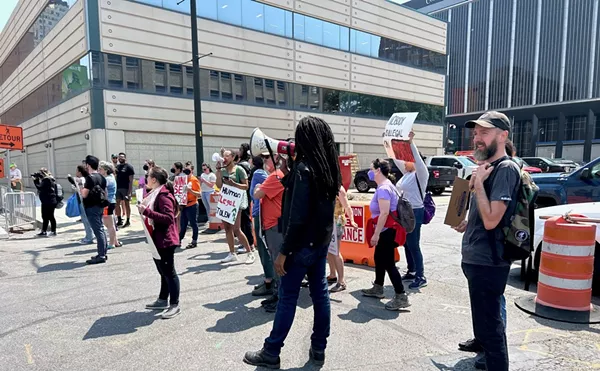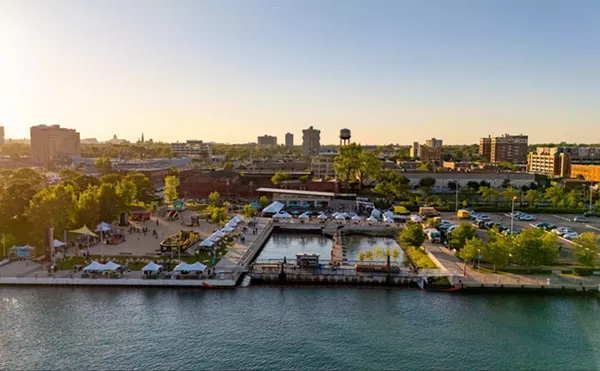
Audio By Carbonatix
[
{
"name": "GPT - Leaderboard - Inline - Content",
"component": "35519556",
"insertPoint": "5th",
"startingPoint": "3",
"requiredCountToDisplay": "3",
"maxInsertions": 100,
"adList": [
{
"adPreset": "LeaderboardInline"
}
]
}
]
Mohammad Abdollahi knew he could be sacrificing his future in America — and maybe even his life — when he participated in a protest at the office of Sen. John McCain last week.
The 24-year-old former student — known as Mo to his friends — has been living in Ann Arbor since the age of 3, when his family came to this country from Iran. But because his parents never obtained legal residency here, Abdollahi risked attracting the attention of immigration officials when he and four others staged a sit-in at the Tucson, Ariz. office of McCain, an Arizona Republican.
They were there to help gain support for passage of the DREAM Act, a bill that's been languishing in Congress since it was introduced in 2001. An acronym for Development, Relief and Education for Alien Minors, the DREAM Act's intent is to help the foreign-born children of illegal immigrants more easily gain access to American colleges and to provide a path to citizenship for those who obtain advanced degrees or join the military.
McCain was chosen as a target for the protest because he failed to vote on the legislation after originally signing on as one of its sponsors in 2007.
Three of those who joined in the protest at McCain's office are also undocumented, though Abdollahi faces a potential peril that his fellow protestors don't. Along with being an illegal immigrant, Abdollahi is also openly gay. If he were deported to his homeland in Iran, his homosexuality could mean imprisonment, torture and even a death sentence, according to the group Human Rights First.
Fully aware of the possible consequences, Abdollahi and the others walked into McCain's office wearing dark blue mortarboards and gowns shortly before noon. Then they sat down and waited to be arrested after refusing to leave once the office closed later that afternoon.
The misdemeanor trespassing charge stemming from the sit-in is the least of Abdollahi's problems at this point. As the result of the arrest, he was also ordered to undergo a hearing before the U.S. Citizenship and Immigration Services in Detroit on June 18, Abdollahi says.
Contacted by phone in Arizona last week, Abdollahi showed a remarkable lack of stress given the serious nature of his predicament.
"We all have risks," Abdollahi said, referring to his fellow protestors. "My risk is a little bit higher, but, to me, it is no different."
In his view, the larger problem of young immigrants forced to suffer the consequences of decisions made by their parents is the real issue.
Others, however, aren't as reticent when describing just how dire Abdollahi's situation is.
"He's putting his life on the line for us," says Prerna Lal, co-founder of DREAMactivist.org.
Lal recognizes that his friend could wind up being a martyr for immigration reform, but also understands why he is willing to take the risk.
"For Mo," Lal says, "it is scarier to live in limbo."
That limbo is part of the immigration debate that often gets ignored. It involves the children of parents who are in this country illegally.
"Their parents earned this," Margo Cowan, Abdollahi's attorney, says. "They scrubbed our toilets; they took care of our elderly. This is not a gift."
The predicament of these young people is explained on the website of the National Council of La Raza, a Latino civil rights and advocacy organization.
"Every year," according to the group, "U.S. high schools graduate approximately 65,000 immigrant students. Brought to this country as young children, they have grown up in American K-12 schools and share our culture and values. Like their U.S.-born peers, they dream of pursuing higher education. Unfortunately, due to their immigration status, they are barred from the opportunities that make a college education affordable — in-state tuition rates, state and federal grants and loans, most private scholarships, and the ability to legally work their way through college. In effect, they are denied the opportunity to share in the 'American Dream.'"
For Abdollahi, that grim reality hit with full force after he graduated from high school and then obtained an associate's degree in health and human services from Washtenaw Community College.
He said that his parents had attempted to become legal residents, but an accounting snafu involving $20 and bad counsel from an immigration attorney derailed that effort. Unable to remain in the country legally, the family remained here nonetheless.
The consequences of that decision hit Abdollahi with full force when he attempted to enroll at Eastern Michigan University.
Abdollahi recounts the experience on the website thedreamiscoming.com:
"After high school, I worked to save enough money to pay out-of-state tuition [since he wasn't a legal resident of Michigan]. When I had enough community college credits to transfer, I applied to Eastern Michigan University. I sat in the counselor's office, handed him my transcript, and he told me, 'Mohammad, you are the kind of student we want at this university.' He then handed me an acceptance letter. I was in.
"I looked at this letter and thought of my mother. With this piece of paper, I could go to my mother and tell her that she didn't have to stay up late crying anymore, that she didn't have to blame herself anymore, that she hadn't done her children wrong by bringing them to this country. I could tell her it was all worth it. Then, the counselor brought back his supervisor, who told me that they could not accept me. ... The counselor then reached over his desk and took my acceptance letter from me."
That experience helped transform Abdollahi into a DREAM Act activist.
According to Jonathan Weinberg, a Wayne State University Law School professor who specializes in immigration issues, it is unlikely Abdollahi would be granted asylum on the basis of the persecution he would likely face in Iran because of his homosexuality. The obstacle, Weinberg says, is that Abdollahi has probably been in the country too long to qualify for asylum. He could, however, be eligible for what's known as "withholding of removal" status, which is similar to asylum in that it allows potential deportees facing persecution to remain in this country. Unlike asylum, however, those granted such status do not have the right to apply for permanent legal residence, according to the group Immigration Equality.
But Abdollahi is hoping it doesn't get to that point. He and other activists are trying to ramp up pressure in an attempt to get the Senate to pass the DREAM Act within the coming months. To that end, Abdollahi says, more protests are being planned at the offices of senators who originally supported the bill but appear to have now backed away from it.
The next target, he says, is likely to be Michigan Democrat Debbie Stabenow. Now facing the possibility of deportation and whatever frightening fate that could accompany that back in Iran, Abdollahi views passage of the act with a new sense of urgency. But he also sees it as an issue much bigger than his own case.
"This is not about our individual selves," Abdollahi says. "This is about the DREAM Act being passed."
Robert Guttersohn is a Metro Times editorial intern. Contact him at letters@metrotimes.com




